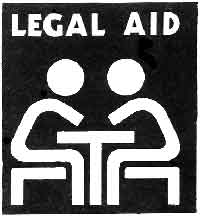
 |
Online
Archive
|
| Issue 12 - May 1973 |
| Legal Aid |
 The new legal
aid system that started on 2nd April has been acclaimed as a new step
forward in extending solicitors' work into areas little covered by
the legal profession - e.g. welfare law, housing law in its widest
sense, and obligations of local authorities in 'deprived' areas. Its
purpose is to extend the number of people who qualify and to ensure
proper remuneration for solicitors. It does not, however, induce solicitors
to work on special problems in deprived areas. One does not doubt the
good intentions of better remuneration rather than wider legal services. The new legal
aid system that started on 2nd April has been acclaimed as a new step
forward in extending solicitors' work into areas little covered by
the legal profession - e.g. welfare law, housing law in its widest
sense, and obligations of local authorities in 'deprived' areas. Its
purpose is to extend the number of people who qualify and to ensure
proper remuneration for solicitors. It does not, however, induce solicitors
to work on special problems in deprived areas. One does not doubt the
good intentions of better remuneration rather than wider legal services.
In 1969, the new scheme was described as a "powerful impetus ... so that adequate legal services will be found wherever the need for them lies", and to establish a framework that will meet the needs of the whole community in all its sections. Although advice for tribunals will be included in the new scheme and also perhaps providing advice at the Tribunal itself not enough emphasis has been laid on the need for new areas to be included. The Tribunal is the main area of confrontation between the individual and the administration. In almost all Tribunals the authority benefits from the expert advice and representation. The individual who in most cases is likely to be poor or ignorant or both, is in the vast majority of the cases on his own. Furthermore, this scheme ignores the needs of the middle bracket income, where the applicant is earning too much to qualify for legal aid and yet not enough to afford the high cost of solicitors' fees. It has been suggested that Citizens Advice Bureaux and other similar agencies should extend their definition of 'legal work' to include industrial tribunal matters, national insurance and supplementary benefits. Also the CAB and other referral agencies should have a list of solicitors prepared to take on the less attractive cases - landlord/tenant, unfair dismissal and consumer complaints. This is how it works: Anyone over 16 years can get legal advice from a solicitor on the Legal Aid Panel, a list which is available from any CAB or court office. If you are on supplementary benefit and do not have more than £250 capital with no dependants, £375 with 1 dependant, £455 with 2 dependants, £495 with 3 dependants and £40 for each additional dependant, you'll be able to get free advice. If you are employed you may get advice To arrive at these sums you must, if married, take into account your wife's income and capital, unless you live separately or if the matter is against her interests. a) With regard to assessing your capital you may leave out the value
of your house, its contents, and your clothes and tools for work. After advice if it is necessary for the matter to be taken to court legal aid, if it is granted, will be available in the crown courts, and the court of appeal for most cases except those wholly or partially concerned with libel or slander. In the House of Lords for all appeals. In the Magistrates Court for many civil actions. In the Industrial Relations Court but not for the Industrial Relations Tribunals. Also in the Lands Tribunal for instance in cases of compulsory purchasing orders and rate appeals. CRIMINAL CASESYou should get legal advice immediately in such a situation. Again the system of finding out your means exists. However, the Law Society decide whether or not your claim is worthwhile and are not keen to waste public money. This could result in a dangerous situation of the Law Society acting as a judge on the case before providing money for what should be a natural right to be represented. Generally speaking, as soon as you have any problems, be it payment of bills or simply the writing of a letter, do not hesitate but go and make an appointment with a solicitor. If you can't go yourself you can send a friend or relative on your behalf. Do not worry if you are not earning under £20.00 after the deductions because they will assess your means and ask you to make a contribution. Then you can decide whether to accept legal aid or not. Rich |